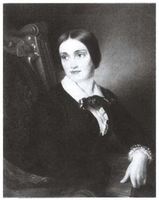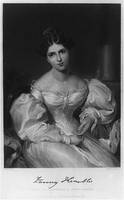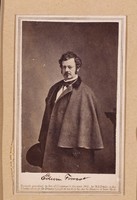Cushman's Transatlantic Success, New York Daily Herald, March 21, 1845
Dublin Core
Title
Subject
Description
The article praises Cushman who "has created a sensation in the theatrical world of London." She is presented as the next Mrs Siddons.
A critic of the Morning News is denounced for stating that "Miss Cushman has been indebted to the good offices of Mr. Macready." Said critic is an admirer of Mr. Forrest who has received rather negative comments in the press on his performances lately. The author of the Herald's article makes a case of the "absurdity and faleshood" of the Morning News's claims as "the very papers which are and have been inimical to Macready are as loud as any in the praises of Miss Cushman."
The author also reminds the reader that "Macready and Miss Cushman became estranged before the departure of the former from this country" which is, apparently an open secret. The author scolds New York society for not acknowledging Cushman's genius earlier.
Credit
Date
Type
Article Item Type Metadata
Text
The enthusiastic fervor with which the London journals, without exception--speak of Miss Cushman and her acting, is so different from the cold, cautious, and restrained tone which usually characterizes the criticisms of the English metropolitan press, that we may well feel astonished. Miss Cushman has created a sensation in the theatrical world of London, such as had no parallel since the time of Kean, Kemble, or Miss O'Neill. She is represented in the most unhesitating manner as the only great actress of the age, and she is declared to have already established claims to the tragic crown of Mrs. Siddons. Mr. Edwin Forrest, on the other hand, has entirely failed in eliciting the favorable opinion of he London audiences and critics. His performances have been criticised with great severity, but strict justice; and he is set down as a respectable second-rate or third rate actor. Of Mr. Hackett, not much is said, as they had not seen much of him, but what is said is in the highest degree complimentary to that very finished and excellent actor. Such is the very remarkable theatrical intelligence we have just received from London.
As may be readily imagined, the particular friends of Mr. Forrest here are very much chagrined, in consequence on their favorite's ill success in obtaining a reversion of the judgment pronounced against him, on his first appeal to English opinion, some years ago. One of Mr. Forrest's admirers, a miserable and conceited scribbler in the Morning News.-- who pretends to know everything about theatricals and the drama, but in reality knows just nothing,-- affects to have discovered the cause of the remarkable outburst of public opinion in London in favor of Miss Cushman, who has been hailed there as the regenerator of the stage, and a second Mrs. Siddons, whilst Mr. Edwin Forrest has, by the same judges, been assigned his appropriate position as a third-rate, or possibly in some cases a second-rate actor. This critic insinuates that Miss Cushman has been indebted to the good offices of Mr. Macready for the enthusiastic encomiums which the London press have pronounced upon her. The absurdity and faleshood of this will at once appear, when the well known fact is stated, that the very papers which are and have been inimical to Macready are as loud as any in the praises of Miss Cushman. But, besides, it is very well known that Macready and Miss Cushman became estranged before the departure of the former from this country. The public will thus be able to estimate at its proper value this paltry attempt to depreciate the effect of the warm laudations of Miss Cushman by the London press. By her own unaided talent and genius, that lady has earned this exalted reputation, and an intelligent public will not permit such efforts as that of the Morning News critic to detract from it.
Here let us reflect for a moment on the singular and interesting indications of a new era in the history of the drama, afforded us by the triumph of Miss Cushman. We have repeatedly, in speaking of the declining fortunes of the drama, on both sides of the Atlantic, for the last few years, stated as on of the prominent causes of its decay, the traditionary influence of the green-room. Young and rising, and genuine dramatic talent was judged not on its own intrinsic merits, but by comparison with some imaginary standard created by the dreamy recollections of the past. And following out this idea, we have more than once expressed our belief that if any great dramatic genius was again to resuscitate the English drama, it would make its appearance in this country, far away from any of the associations, influences, or conventionalisms of the "old Drurys," as the are called, either of England or the United States. And so it has been.-- The two greatest actors of this age have been thus produced. They are Miss Cushman in London, and Mrs. Anderson in America.
The influence of Miss Cushman's signal triumph on the London stage, will be great and enduring. A new era in the history of the English drama will date from this period. Bold, original and powerful dramatic genius will be developed in many quarters on both sides of the Atlantic, and the stage receive an impulse which nothing else could have communicated. We have given, the London journalists say, a second Mrs. Siddons to England; who knows but we may also be enabled to give them the next Shakspeare [sic] or Sheridan? What is there to prevent us from thus paying off a part of the debt which our literature owes to the fatherland, long before the secoundrel legislatures of the repudiating States be able to sette their scores with the same old stock? [...]
Are ye not ashamed, ye conceited, empty-headed, impertinent, assuming, purse-proud cod-fish aristocracy of New York, that ye did not find out what a treasure ye had in Miss Cushman? What have ye to say, ye miserable critics, windy, conceited, and vaporing as ye are, that ye never found out the talents of this "second Mrs. Siddons?" A more burning brand of shame sad disgrace could not be stamped upon the taste of the mushroom fashionables and addle-pated critics of New York, than this universal, liberal and generous outpouring of applause by the London press on the genius and talents of Miss Cushman!






